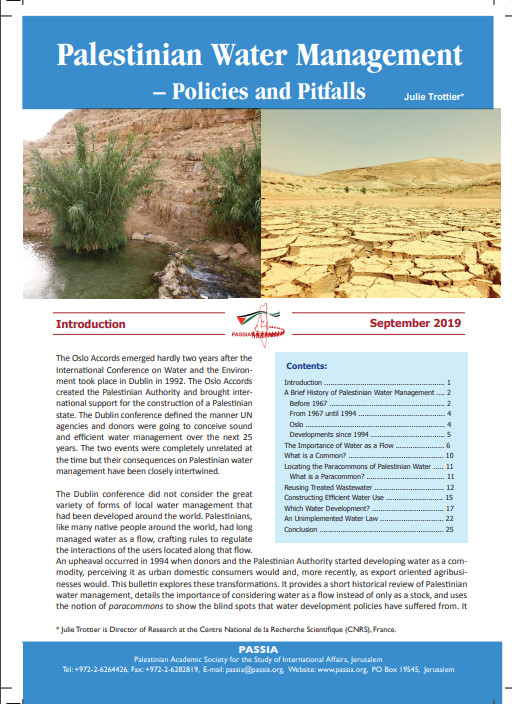Palestinian Water Management – Policies and Pitfalls
 |
publicación Sep 2019 ; 29 páginas
Aut. Julie Trottier
Ed. PASSIA - Jerusalem
Formato descargable: PdF
Descargable desde el editor
Abstract:
An upheaval occurred in 1994 when donors and the Palestinian Authority started developing water as a commodity, perceiving it as urban domestic consumers would and, more recently, as export oriented agribusinesses would. This bulletin explores these transformations. It provides a short historical review of Palestinian water management, details the importance of considering water as a flow instead of only as a stock, and uses the notion of paracommons to show the blind spots that water development policies have suffered from. It interrogates the notion of “efficient water use” in terms of environmental justice and shows the unintended consequences of the water development efforts over the past 25 years: Policies based on the notion of virtual water are not decreasing the consumption of water in agriculture. Present projects of wastewater reuse in irrigation are not decreasing the pressure on the aquifers. More crucially, the present water driven Palestinian agricultural frontiers are deeply transforming Palestinian society. This bulletin ends by considering possible ways forward to improve the Palestinian water situation. Contents:
Introduction . 1
A Brief History of Palestinian Water Management . 2
Before 1967 . 2
From 1967 until 1994 . 4
Oslo . 4
Developments since 1994 . 5
The Importance of Water as a Flow . 6
What is a Common? . 10
Locating the Paracommons of Palestinian Water . 11
What is a Paracommon? . 11
Reusing Treated Wastewater . 12
Constructing Efficient Water Use . 15
Which Water Development? . 17
An Unimplemented Water Law . 22
Conclusion . 25
Palabras clave: |
prácticas de gestión empresarial / gobierno (CI) (DT) (HP) (ope) |
País: |
Editor/Difusor: |
|
PASSIA
-
Palestinian Academic Society for the Study of International Affairs - Jerusalem - Autoridad Nacional Palest |
Si hay un enlace roto, estaremos encantados de recibir un mensaje: communication@pseau.org